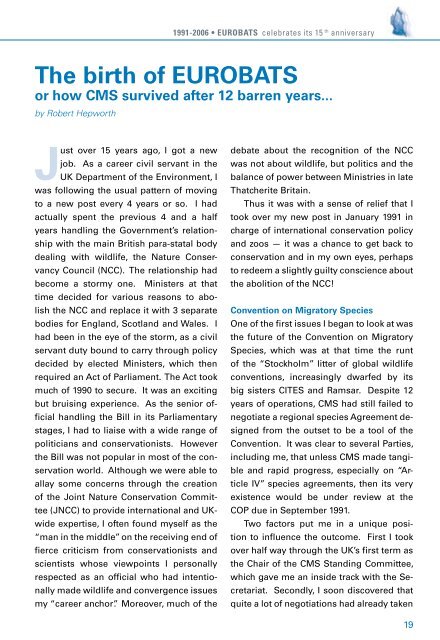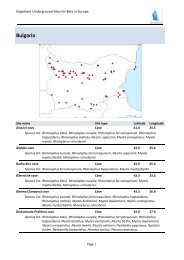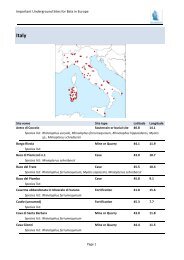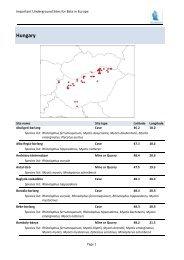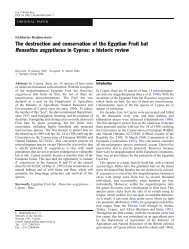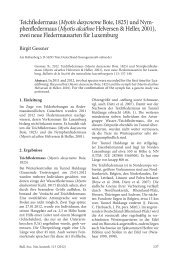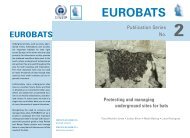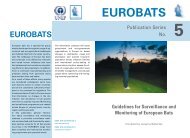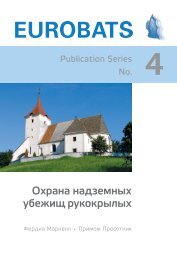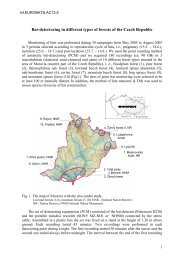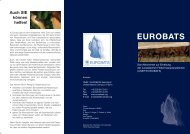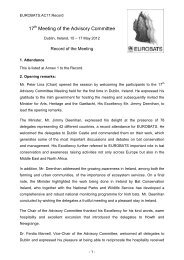1991 - 2006. EUROBATS celebrates its 15th anniversary
1991 - 2006. EUROBATS celebrates its 15th anniversary
1991 - 2006. EUROBATS celebrates its 15th anniversary
You also want an ePaper? Increase the reach of your titles
YUMPU automatically turns print PDFs into web optimized ePapers that Google loves.
Just over 1 years ago, I got a new<br />
job. As a career civil servant in the<br />
UK Department of the Environment, I<br />
was following the usual pattern of moving<br />
to a new post every 4 years or so. I had<br />
actually spent the previous 4 and a half<br />
years handling the Government’s relation-<br />
ship with the main British para-statal body<br />
dealing with wildlife, the Nature Conser-<br />
vancy Council (NCC). The relationship had<br />
become a stormy one. Ministers at that<br />
time decided for various reasons to abo-<br />
lish the NCC and replace it with 3 separate<br />
bodies for England, Scotland and Wales. I<br />
had been in the eye of the storm, as a civil<br />
servant duty bound to carry through policy<br />
decided by elected Ministers, which then<br />
required an Act of Parliament. The Act took<br />
much of 1990 to secure. It was an exciting<br />
but bruising experience. As the senior of-<br />
ficial handling the Bill in <strong>its</strong> Parliamentary<br />
stages, I had to liaise with a wide range of<br />
politicians and conservationists. However<br />
the Bill was not popular in most of the con-<br />
servation world. Although we were able to<br />
allay some concerns through the creation<br />
of the Joint Nature Conservation Commit-<br />
tee (JNCC) to provide international and UKwide<br />
expertise, I often found myself as the<br />
“man in the middle” on the receiving end of<br />
fierce criticism from conservationists and<br />
scientists whose viewpoints I personally<br />
respected as an official who had intentionally<br />
made wildlife and convergence issues<br />
my “career anchor”. Moreover, much of the<br />
<strong>1991</strong>-2006 • <strong>EUROBATS</strong> <strong>celebrates</strong> <strong>its</strong> 15 th <strong>anniversary</strong><br />
The birth of <strong>EUROBATS</strong><br />
or how CMS survived after 12 barren years...<br />
by Robert Hepworth<br />
debate about the recognition of the NCC<br />
was not about wildlife, but politics and the<br />
balance of power between Ministries in late<br />
Thatcherite Britain.<br />
Thus it was with a sense of relief that I<br />
took over my new post in January <strong>1991</strong> in<br />
charge of international conservation policy<br />
and zoos — it was a chance to get back to<br />
conservation and in my own eyes, perhaps<br />
to redeem a slightly guilty conscience about<br />
the abolition of the NCC!<br />
Convention on Migratory Species<br />
One of the first issues I began to look at was<br />
the future of the Convention on Migratory<br />
Species, which was at that time the runt<br />
of the “Stockholm” litter of global wildlife<br />
conventions, increasingly dwarfed by <strong>its</strong><br />
big sisters CITES and Ramsar. Despite 12<br />
years of operations, CMS had still failed to<br />
negotiate a regional species Agreement designed<br />
from the outset to be a tool of the<br />
Convention. It was clear to several Parties,<br />
including me, that unless CMS made tangible<br />
and rapid progress, especially on “Article<br />
IV” species agreements, then <strong>its</strong> very<br />
existence would be under review at the<br />
COP due in September <strong>1991</strong>.<br />
Two factors put me in a unique position<br />
to influence the outcome. First I took<br />
over half way through the UK’s first term as<br />
the Chair of the CMS Standing Committee,<br />
which gave me an inside track with the Secretariat.<br />
Secondly, I soon discovered that<br />
quite a lot of negotiations had already taken<br />
19


